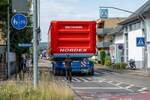News Release from windfair.net
Wind Industry Profile of
DEWEK 2017: Tendering System Calls for Further Cost Reductions
The wind has become harsher in recent months in the German wind energy industry. Due to the imbalance of some domestic turbine manufacturers, their suppliers have also run into difficulties. Factories were closed and jobs eliminated. This is in part due to the conversion of the German system to tendering procedures. First results clearly show the problems of the regulatory framework, which will be an important task for the coming federal government to fix.
But there are also other problems with climate protection not due to the system change: only recently, Germany, which has declared itself to be a pioneer of the energy transition, had to admit that it will miss the climate protection targets set for 2020. And not only sharp as a hair, but crunching. Particularly in view of the Paris climate agreement and the global concern about the withdrawal of the US, there is a great need for action in order not to lose even more credibility. In areas such as electromobility and sector coupling, Germany has by no means exhausted its full potential in the past.
"Against the backdrop of the Paris climate agreement, we cannot afford to simply rest on our laurels, rather we must continue to implement the shift from fossil fuels and nuclear energy towards renewable ernergy with more determination than ever. In doing so, wind energy on- and offshore plays a key role in the energy sector," said Stefan Wenzel, Environment Minister of Lower Saxony, Germany, in the run-up to the event. No easy time for the industry to came together at DEWEK in Bremen.
 But there were also positive reports, as Bruce Bailey, Vice President for Renewable Energy at UL International, pointed out: For example, the capacity of wind energy installed worldwide this year broke the 500 gigawatt barrier for the first time. In recent years, the sector has also developed into a serious industry that provides jobs on all continents. Research has also made enormous progress - and at ever shorter intervals: "The pace of change is accelerating," said Bailey in his opening speech.
But there were also positive reports, as Bruce Bailey, Vice President for Renewable Energy at UL International, pointed out: For example, the capacity of wind energy installed worldwide this year broke the 500 gigawatt barrier for the first time. In recent years, the sector has also developed into a serious industry that provides jobs on all continents. Research has also made enormous progress - and at ever shorter intervals: "The pace of change is accelerating," said Bailey in his opening speech.
On the other hand, however, this also requires the market to become faster and more agile in order to adapt to the circumstances. Nevertheless, Ronny Meyer, State Councillor for the Environment and Central Affairs in the city of Bremen, also saw the opportunity to create more jobs in countries which, due to a lack of raw materials, cannot score with fossil energy production and are dependent on expensive imports. He called on his own government in Germany to improve the tendering system.
In any case, the tenders were always the focus of the event. Conference participants agreed that the promotion of civic energy - a German speciality - will continue to be important in Germany in the future, but that an existing emission permit must be obligatory for all participants in the invitation to tender. Also, a lifting of the extension cap was repeatedly demanded.
Further cost reductions, which are also necessary with regard to tenders in particular, are perfectly feasible in the technical area. In three parallel panels, the experts gave presentations on various aspects during the whole two days, presenting innovative projects and providing information on the status of their research.
The conclusion of DEWEK 2017 is that although times are rougher, wind energy research and development has by no means yet come to an end. Provided that the political framework is right, the industry can set about tackling the next 500 gigawatts.
- Author:
- Katrin Radtke
- Email:
- press@windfair.net
- Keywords:
- DEWEK, event, Germany, conference, EEG, tender


























